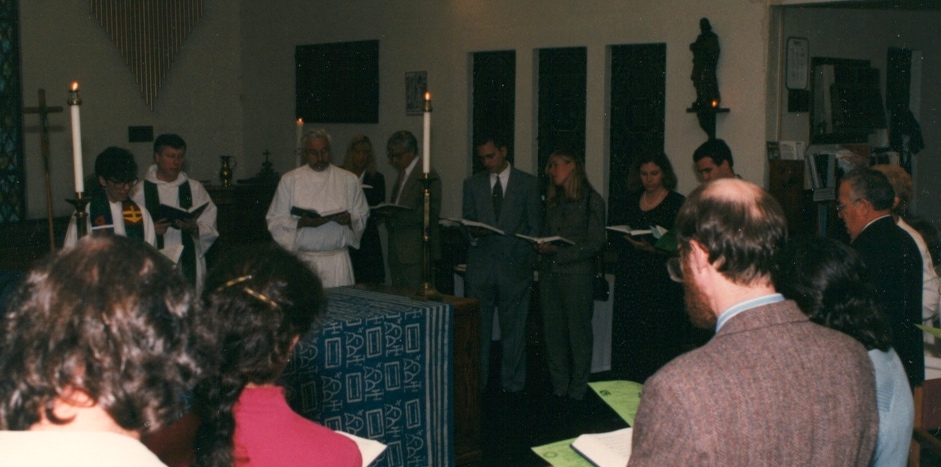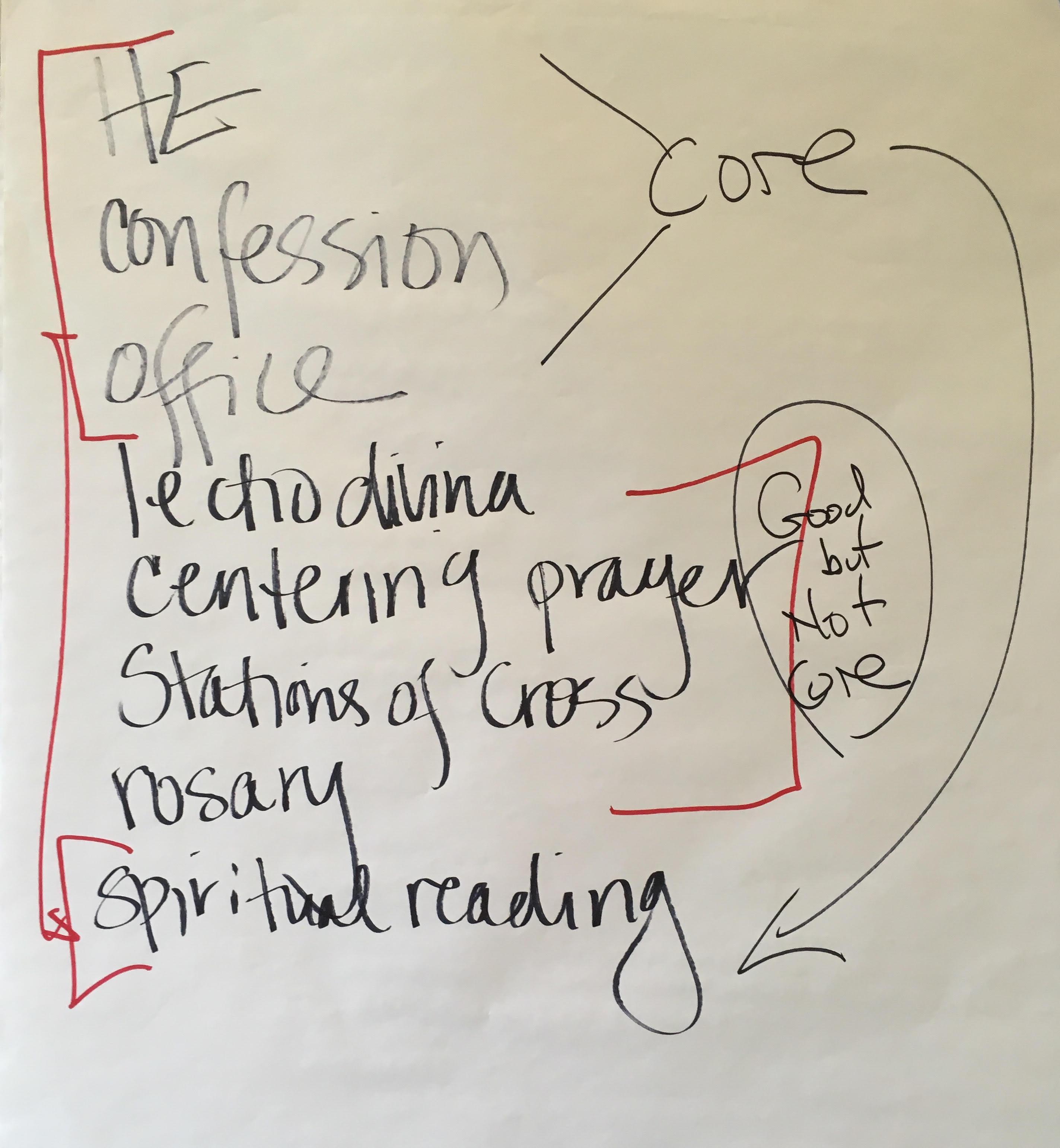What does it mean for a parish priest living in the 21st Century to feed the sheep? What does that look like?
1. Think eternal and paradoxical
In the broadest sense I'd suggest it means preparing people to live here and now in light of the End, the Resurrection of the Body.
The Catechism says --
Q. What do we mean by the resurrection of the body?
A. We mean that God will raise us from death in the fullness of our being, that we may live with Christ in the communion of the saints.
John Macquarrie wrote, "The end, we have seen reason to believe, would be a commonwealth of free, responsible beings united in love."
They each point us to God's resolution to one of our primary struggles --
-what all societies struggle with: the polarity of individualism and community/commitment
-and what each person struggles with: how to be a self and also be in relationship with others.
The church's ancient response to it all is that we get to share in the divine life, we get to share in the life of the Blessed Trinity
So the Father is God, the Son is God, and the Holy Ghost is God.
And yet they are not three Gods, but one God. ...
And in this Trinity none is afore, or after other; none is greater, or less than another;
But the whole three Persons are co-eternal together and co-equal.
So that in all things, as is aforesaid, the Unity in Trinity and the Trinity in Unity is to be worshipped.
Us too.
So, teach all that and all shall be well. Right?
Not really. But it is step one.
2. Focus on the primary oscillation of the baptized
There are two main things to hold in mind.
All the baptized live within a cycle between renewal and apostolate. Renewal in baptismal identity & purpose and an apostolate in daily life. We become light so we may share light. We are fed so we may feed. The pastoral call is to engage people in their own renewal.
and

For most of the baptized the journey into maturity is lived in the routines of daily life -- at work, with family & friends, and in civic life. So, we need to move from the natural drawing of our attention into "institutionalism" (in which the parish programs and life are at the center) to "The Body of Christ" (in which our focus is the organic rhythms of the Body). Benedict's idea of being "a school of the Lord's service" may be useful as an image. But in this case it is a school in which we train and coach people so they may be light in family and friendships, at work, in civic life and in the church.
3. Manage the "demand system"
The "demand system" of all parishes will be around the institutional needs and wants. In part because when you're the vicar you become acutely aware of every leak. And also because the majority of every parish will consist of the stable and static, the tentative, immature, and those just beginning to experiment with taking responsibility in partnership with the church for their spiritual life. Most of them when asked about the use of parish resources, especially the priest's time, will either offer a conventional response such as "visit the sick" or "create a program to help the homeless" or say "fix the leak." Many will go on to wonder why the vicar gets a full time salary for such little work.
How can we effectively address the problem? Stephen Covey wrote, "The key is not to prioritize what's on your schedule but to schedule your priorities." Another way of saying it is -- don't allow the existing demand system to drive you; create a new demand system. Scheduling a public daily office Monday through Saturday will create a new expectation; a demand upon your time. It will force other things to wait. That of course is the point Benedict was making. Publicly and well in advance schedule quiet days and times available for hearing confessions in Lent and Advent.
 4. Train and coach
4. Train and coach
Saint Paul saw the process of spiritual growth as being like an athlete. If you are to run the race you need training and coaching.
Most parish work in adult formation totally ignores Paul's way. We lecture and allow questions (if there is time). We offer an Instructed Eucharist instead of a Eucharistic Practices program. We teach the history of the Prayer Book instead of how to say the Office on your own at home.
We will not get this right until we change the mental model in our head.
And -- the mental model won't really change until you behave differently. So, two hints
Designing and implementing the training/coaching
Always include a significant element of experiential education and consider changing the order in which you do things. For example, when teaching about baptism, do this -
-Invite them to gather in groups of three and each share a story related to their own baptism (about 5 minutes each)
-ask them to gather at the font
-pour water into the font
-bless the water using the prayer from the Baptismal rite
-tell them of the tradition of connecting with your baptism by putting your hand into the water and blessing yourself
-and then have them one-by-one, slowly do it.
-if the numbers allow for it you may have them softly sing a hymn or you could read a series of quotes about baptism
-Have them talk in the groups of three about this experience - what they felt, thought; any memories that came to mind. Invite anyone who wants to to share with the whole group.
Only then might you offer a few thoughts on the meaning of baptism or a bit of interesting liturgical history about the sacrament.
 Have a plan for acting upon a pastoral strategy.
Have a plan for acting upon a pastoral strategy.
You need to begin with a framework such as Thornton's Remnant Theory or my Shape of the Parish model. It also works if you use other models such as Renewal-Apostolate Cycle or Benedictine Promise.
The Remnant and Shape of the Parish models assume the people of the parish are in a variety of different places in their journey; that they are in different stages of Christian proficiency.
Both assume that a significant way in which you can shape the climate of the parish is by nurturing those at the center - the Remnant, the Apostolic. They are likely to be fed by being able to join in the Office frequently and by going on retreat. A form of group spiritual guidance might be useful. And they will often be served by being able to participate in activities that are primarily directed toward the next group.
The parish probably has a few people ready to progress in their spiritual life. Have an offering on living by Rule and developing your own spiritual discipline. A couple of three session modules of a three year Adult Foundations Course -- this year it might be 1) Benedictine Spirituality and 2) exploring your ministry in workplace and civic life, with family and friends.
There may also be a few people in an experimenting phase. Don't ask them to serve on the vestry (even if they are willing). Sit with them. Ask them about their spiritual life line and current spiritual practices. Ask them about their hopes and longings. Get a sense of their readiness. Some will need milk, others will be ready for meat (these are biblical images 1 Cor 3.2, not political statements). Some will drift back into immature or tentative places, others may move quickly in a progressing sacramental phase.
Don't fuss about those who are immature or tentative. And certainly don't obsess about the very occasional attender. There really isn't much you can do for them until they are ready. Accept and love them.
Therefore, sit down now and place on the parish schedule a spiritual retreat at a monastic house for those interested, times for confessions during Advent and Lent, a two session program on developing your spiritual discipline, an Anglican Spiritual Practices course for fall, the two or three modules of the Adult Foundations Course for the coming year. Also schedule some time in the coming weeks to develop an attractive way of inviting people to participate -- posters around the parish, stories of people who have gone in the past, a special page on the parish web site for each activity, etc.
 5. Get a workable image in your mind regarding time use
5. Get a workable image in your mind regarding time use
Keep working at changing the demand system until you get close to:
Weekday Office and Eucharist
Sunday Eucharists
Preparation
Possible the single most important thing you can do to feed the sheep is to pray with the Remnant/the Apostolic.
- 50% -- providing training and coaching for the baptized in the stuff of Christian proficiency
What counts here -- the person goes away from the time with you with an increased ability to say the Office, participate in the Eucharist, use a form of personal devotions that fits their personality and circumstances, make moral decisions, see the ways in which they are and can be "light" in work, with family and friends, in civic life,
Your weekly enewletter message counts if it is really s form of moral and spiritual guidance. If it is plugging parish programs or fund raising -- not so much.
- 15% -- institutional attention
Parish administration and leadership. Vestry and committee meetings, reports, being on diocesan committees.
- 10% -- personal pastoral attention
Visiting the sick, being with people in crisis
This will vary depending on the size of the parish and your gifts.
These things do overlap. You may find yourself doing some important spiritual guidance at the bed side of a cancer patient or you may just be holding a hand (not a bad thing to do).So, it helps to be honest with yourself. Experiment with the percentages in your own situation. What does it tell you?
Suppose you are a vicar serving a parish part time. Say 20 hours/week - Sunday and some time on two other days. The "demand system" that you've created includes serving on two diocesan committees that meet monthly, a monthly vestry meeting and a monthly meeting with the wardens, and being on the board of the town's homeless shelter. That last has you at the shelter for a few hours every week. What do you do?
rag+
 Wednesday, February 14, 2018 at 1:37PM
Wednesday, February 14, 2018 at 1:37PM  It's Lent again.
It's Lent again.  On the First Things web site George Weigel did a tongue in cheek piece -- "Pork Roll, Lent, and Catholic Identity." It caught my attention. I went to a few Trenton Thunder games. I know the only store in Seattle that sells Taylor Pork Roll.
On the First Things web site George Weigel did a tongue in cheek piece -- "Pork Roll, Lent, and Catholic Identity." It caught my attention. I went to a few Trenton Thunder games. I know the only store in Seattle that sells Taylor Pork Roll. 







